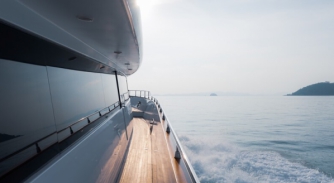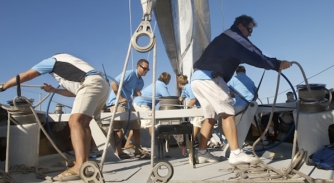Are crew lacking leadership?
Despite some efforts being made to improve mental health on board, little has changed. Can senior leaders do more to truly turn the tide?

Crew happiness has continued to sink amongst superyacht crew, with an urgent need for quality leadership more evident than ever, according to Quay Crew's Mental Health Onboard report. Following the superyacht crew recruitment consultant’s 2021 survey of over 1000 crew, it repeated the research to monitor whether there had been any improvements in mental health onboard since. The responses suggest that, although the industry is moving in the right direction, it is doing so at a snail’s pace and has not yet had a direct positive impact on crew wellbeing.
The new survey, which collected almost 900 responses at the end of 2023, reveals that more yachts are putting policies, practices, and services in place to support crew who may suffer from poor mental health.
“The mental well-being of crew has become more important, with some efforts being made and a notable 13% uptick in respondents who feel adequately informed about handling mental health issues. But whilst people have been talking a good game, there has actually been little to no improvement onboard,” Tim Clarke, Managing Director, Quay Crew tells Superyacht News.
“In fact, the overall mood has dipped a little, with morale decreasing from 7/10 in 2021 to 6.5/10 in our most recent survey. So, despite around 5% more yachts having policies and practices to address mental health, a Mental Health First Aider (MHFA) onboard and providing mental health training and/or shoreside support, a large number of crew are still suffering.”
For context, when comparing 2023 to 2021, there has been an increase in the percentage of respondents experiencing stress (85% vs. 69%), anxiety (65% vs. 57%), and isolation and loneliness (44% vs. 41%). There has also been a 7.5% rise in individuals reporting a decline in their mental health since entering yachting and a 7% increase in the number of individuals contemplating leaving yachting due to mental health concerns.
Chefs not only report the lowest mental well-being and mood compared to other crew members but also endure heightened levels of stress and anxiety. They attribute these difficulties primarily to a lack of support and ineffective leadership within their departments, with instances of low team morale, bullying, and harassment notably higher in these departments too.
“When you think of this logically, this unfortunately isn’t very surprising,” says Clarke. “On boats under 60 metres, you are a chef of one catering for around 14 crew and up to 12 guests several times a day. This means you are always going to have work commitments, therefore it is very hard to get time off, and if the standard of food drops, captains and crew can be very quick to complain. Food is incredibly fundamental to the overall happiness of crew, so they are stuck between a rock and a hard place.”
Clarke speculates that if he were to isolate the data of the size of the vessel, chefs’ morale and mental health would dramatically increase as yachts get bigger as they tend to have more support, albeit while catering for a much larger party. Implementing a two-by-two-rotation policy would greatly benefit the chef’s mental health too, as well as programmes that alleviate the chef’s commitment such as getting takeaway food onboard or going out for meals. Both require an increase in budget, however, which some owners are unwilling to spend.
Almost half (48%) of interior and galley crew have suffered in the past, with two-fifths of saying mental health has deteriorated since working in yachting. A further 20% feel discrimination has contributed to poor mental health onboard and 35% say bullying and harassment are another factor. This is 10% more than another department, which in turn has led them to rate their overall mood the lowest - 6.2 out of 10.
“Given the regular interaction and face-time with owners and guests, the front-of-house element of many interior tasks can cause a level of pressure not necessarily experienced in other roles. A lot can also be said about the limited opportunities to get out on deck and simply get some fresh air sometimes,” explains Caroline Clarke-Jack, Director and Interior Consultant, Quay Crew.
“Having said that, there is simply no excuse for such a significant presence of bullying and harassment, discrimination, and crew tension in the interior. It is therefore expected that the survey results also show the highest levels of anxiety, depression, low self-esteem and isolation/loneliness among Stews and the galley team.”
Captains are least likely to suffer from poor mental health generally (55%) and over a quarter rate their mental health at work as ‘excellent’ and their overall mood is the highest, at 7.5 out of 10. They are however, the most worried about job security (34%) and have a higher proportion than any other department stating that finances are why they haven’t left yachting.
Deck crew is the department that is most worried about not having any other career options outside of yachting and most likely to say having more opportunities to socialise with the team would improve mental health onboard. They are also the most likely to suffer from drug and alcohol misuse and feel under pressure to perform higher than other departments. Almost half have considered leaving yachting due to mental health issues.
Engineering crew on the other hand benefit from the highest time for time rotation and tend to be the most confident in knowing what to do if they experience mental health issues. They are also the most likely to have not suffered from common mental health issues, however, issues at home contribute to poor mental health onboard more than any other department. In terms of career prospects, they are the least concerned about not having a career outside of yachting and the most confident in speaking to Captains about concerns.
Across all departments, a substantial portion of crew members feel unsupported when experiencing emotional distress onboard, with many expressing discomfort in confiding their mental health concerns to their Head of Department (HOD). Just 14% and 7% would approach their Captain or HOD respectively with any concerns, representing no movement since 2021.
The gender and departmental divide in mental health experiences is a persisting issue too, although there have been some slight improvements from previous years. Despite a minor decrease in reports of deteriorating mental health and the urge to leave the profession among interior and galley crew, these areas still demand significant attention in mental health improvement efforts. Around 14% more women than men have suffered from poor mental health whilst onboard and 10% more say their mental health is ‘extremely poor’.
In terms of the core aggravators, burnout and fatigue take pole position with 66.1% of respondents struggling with the workload, followed by tension and crew politics (57.2%) and poor sleep (51.8%). Compared to 2021, 10% more crew members cite burnout and fatigue, 8% more mention crew tension and politics, and 2% more highlight poor sleep.
These trends ultimately reflect on the need for better leadership however with over half of respondents stating that leadership would be most beneficial in improving mental health onboard. “Yachting has historically lacked on the leadership side of things. A lot of people move straight into yachting and aren’t exposed to anything else in terms of how things are done in other industries. So, they repeat what they see, and unfortunately, there are some bad leaders in yachting,” says Clarke.
The lack of leadership can, in part, be attributed to age and inexperience, both of which are most prevalent in the interior. The interior department has the most crew aged 25 to 34 compared to the other departments and also the least longevity in yachting, with over half (51%) having been in the sector less than five years.
“To put this into context, all other departments have at least 10% more crew aged over 35 and 38% or less falling into the sub-five-year category,” says Clarke-Jack. “As a result, junior stews tend to move up the ranks into senior positions more quickly but have little or no experience in people management. Those before them likely lacked this skill too, which is why they may not have had the proper training or support themselves.”
These Chief Stews may be great in front of the boss or guests, but not necessarily be able to effectively run a team. Therefore, leadership training and conflict management and resolution are critical to not only develop excellent interior HODs but also improve the overall mental health of the whole team, adds Clarke-Jack.
The survey also underscores the ongoing importance of adequate leave and rest hours in maintaining mental well-being. It is promising to note a rise in the number of crew members who feel they have sufficient downtime for self-care, along with a slight improvement in leave arrangements.
While there appears to be a lesser association between inadequate leave and poor mental health compared to the previous survey, a considerable portion of crew members with limited leave continue to report mental health issues. Overall, mood tends to improve with extended leave and tenure in the industry, with veteran crew members rating their mental well-being the highest.
When asked what four things would help to improve mental health onboard the most, better leadership, mental health training and awareness, better leave and more downtime and adherence to hours of rest were cited in that order. Looking at these issues, they all revert back to the need for improved leadership. Better managed ships mean that time is optimised for crew, who can get enough rest and downtime to then carry out their daily operations without burning out.
“Although the statistics speak for themselves and fail to uncover any major breakthroughs, the sentiment is that many yachts are trying to make positive changes and that there are some easy to-implement improvements to be made that would bring great rewards,” says Clarke. “There’s also a lot to be said about setting realistic expectations from the outset; ensuring incoming crew are fully aware of the high-pressure environment, and accepting that sometimes, it’s just not a suitable career choice for some people.”
Profile links
NEW: Sign up for SuperyachtNewsweek!
Get the latest weekly news, in-depth reports, intelligence, and strategic insights, delivered directly from The Superyacht Group's editors and market analysts.
Stay at the forefront of the superyacht industry with SuperyachtNewsweek
Click here to become part of The Superyacht Group community, and join us in our mission to make this industry accessible to all, and prosperous for the long-term. We are offering access to the superyacht industry’s most comprehensive and longstanding archive of business-critical information, as well as a comprehensive, real-time superyacht fleet database, for just £10 per month, because we are One Industry with One Mission. Sign up here.
Related news

Captains to descend on Viareggio for YARE
With two weeks to go until the world’s largest gathering of superyacht captains begins, we explore the YARE and the Superyacht Captains Forum agenda
Event

Chief Engineer dies on board
A crowdfunding page has been launched to offer support to the family of Roy Temme, who tragically lost his life this week following an incident on board
Crew

No respite in crew mental health cases
ISWAN has reported a dramatic 58% quarter-on-quarter increase in calls to Yacht Crew Help, with women being affected disproportionately
Crew

Millions marked for unpaid crew
Nautilus secured over a million euros in unpaid wages for crew in 2023, but this year could see the union gain millions more in a single settlement
Crew
-(3).jpg)
Crew guidelines go green
The superyacht industry has introduced technical solutions for energy transition, but changes in on-board practices are equally important
Crew

CHIRP Report: Tender grounded in darkness
What equipment do you have to direct your tender? This crew entered an unfamiliar hazardous area by veering off the course used during daylight hours
Crew
Related news
Captains to descend on Viareggio for YARE
2 years ago
Chief Engineer dies on board
2 years ago
No respite in crew mental health cases
2 years ago
Millions marked for unpaid crew
2 years ago
Crew guidelines go green
2 years ago
CHIRP Report: Tender grounded in darkness
2 years ago
Stricter entry requirements for crew in Mallorca
2 years ago
NEW: Sign up for
SuperyachtNewsweek!
Get the latest weekly news, in-depth reports, intelligence, and strategic insights, delivered directly from The Superyacht Group's editors and market analysts.
Stay at the forefront of the superyacht industry with SuperyachtNewsweek



